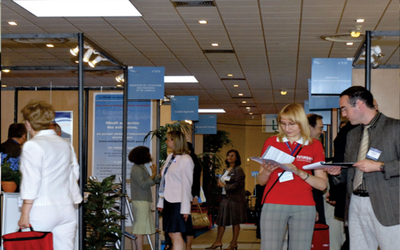Inside BENEO’s new pulse plant: pioneering sustainable protein from faba beans
At a time when global leaders are working towards ensuring zero hunger and committing to share agriculture technologies, World Trade Centre (WTC) Mumbai and All India Association of Industries (AIAI) organized their annual flagship event ‘Global Economic Summit (GES)’ which is now in its 5th edition (GES 2015) with the theme ‘Enabling Food for All.’
Senior Officials from Food and Agriculture Organisation (FAO), International Fund for Agricultural Development (IFAD), World Food Programme (WFP), United Nations Procurement Division (UNPD) World Farmers’ Organisation (WFO) and the World Trade Center’s Association (WTCA), New York and foreign universities like Bocconi (Italy), North Carolina State University in the U.S.A. and University of Manitoba in Canada explained the success stories and efforts taken towards food security and nutrition.
Kamal M. Moraraka, Chairman, WTC, Mumbai said “World Trade Center Mumbai has always been the preferred catalyst for trade. The development and growth of region, a trade center is necessary to promote India’s export competitiveness in the commercial capital. Hence the Global Economic summit is hosted in this city annually as a flagship event for World Trade Centers to come together to discuss topical issues. I welcome the delegates and experts representing over 28 countries to this summit. This shows the potential and significance of this sector.”
Around 500 leaders across the world participated in the 3-day Summit which offered opportunities for networking through plenaries, panel discussions, exhibition, B2B meetings, industry visits and cultural events.
Agriculture in India is still the dominant occupation, providing livelihood to nearly 60% of the population. It is important to note that in India, 80% of land owners are small and marginal, mostly owning less than 2 hectares. As per the World Bank Report, 60.3% of India’s land area is agricultural land. Moreover, the Ministry of Commerce and Industry data highlights that with 157.35 million hectares of the total land cultivated, India holds the second largest agricultural land in the world.
The event discussed the new trends in Indian agriculture and food distribution systems in the context of the challenges of food security in India, examined the key issues impeding the growth of Indian agriculture and evolves an integrated approach to strengthen and modernize the sector by addressing the inherent concerns of the agriculture sector. It has also sought to understand the emerging challenges and prospects of the Indian agriculture and food sectors through shared knowledge and global experiences.
Somesh Batra, Vice chairman, WTC Mumbai, said “In India, agriculture is still the dominant occupation, providing livelihood to nearly 60% of the population. However, the benefits and policies have not reached the farmer. GES 2015 opens a platform to discuss the latest trends in farming, ICT in agriculture, the role of women and the engagement of youth in farming. We need to learn from the FAO, IFAD, WFP and WFO insights and experiences shared.”
Vijay Kalantri, President AIAI, said “GES 2015 addressed the fundamental issues concerning food and nutrition security, food safety and standards in emerging economies, to bring them at par with international standards. This The Summit will strengthen linkages between the farmers, SMEs and policy makers.”
The event highlighted the way for hunger reduction as an integrated approach, which would include public and private investments to raise agricultural productivity, better access to inputs, land, services, technologies and markets, measures to promote rural development, social protection for the most vulnerable, specific nutrition programme.

